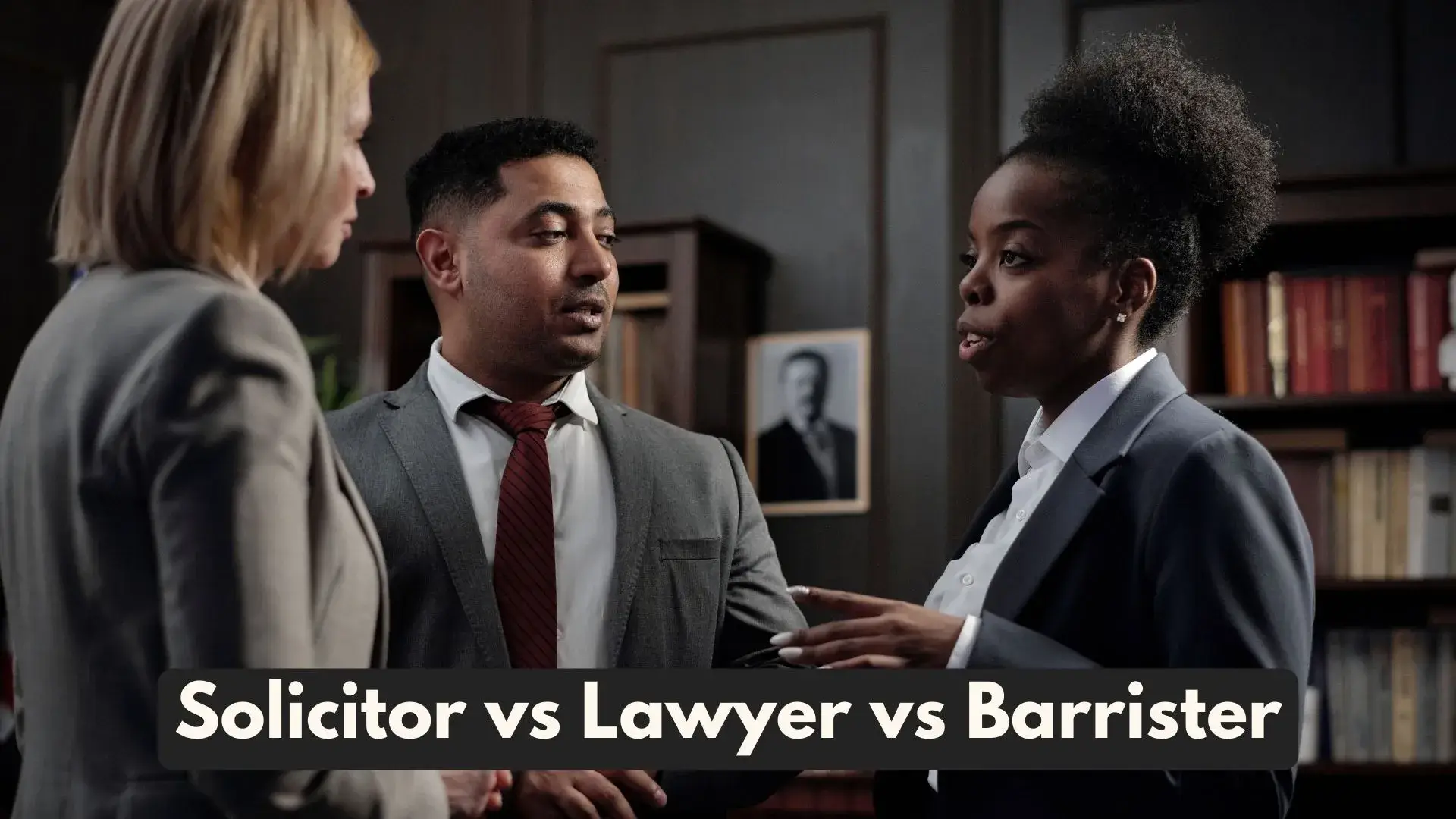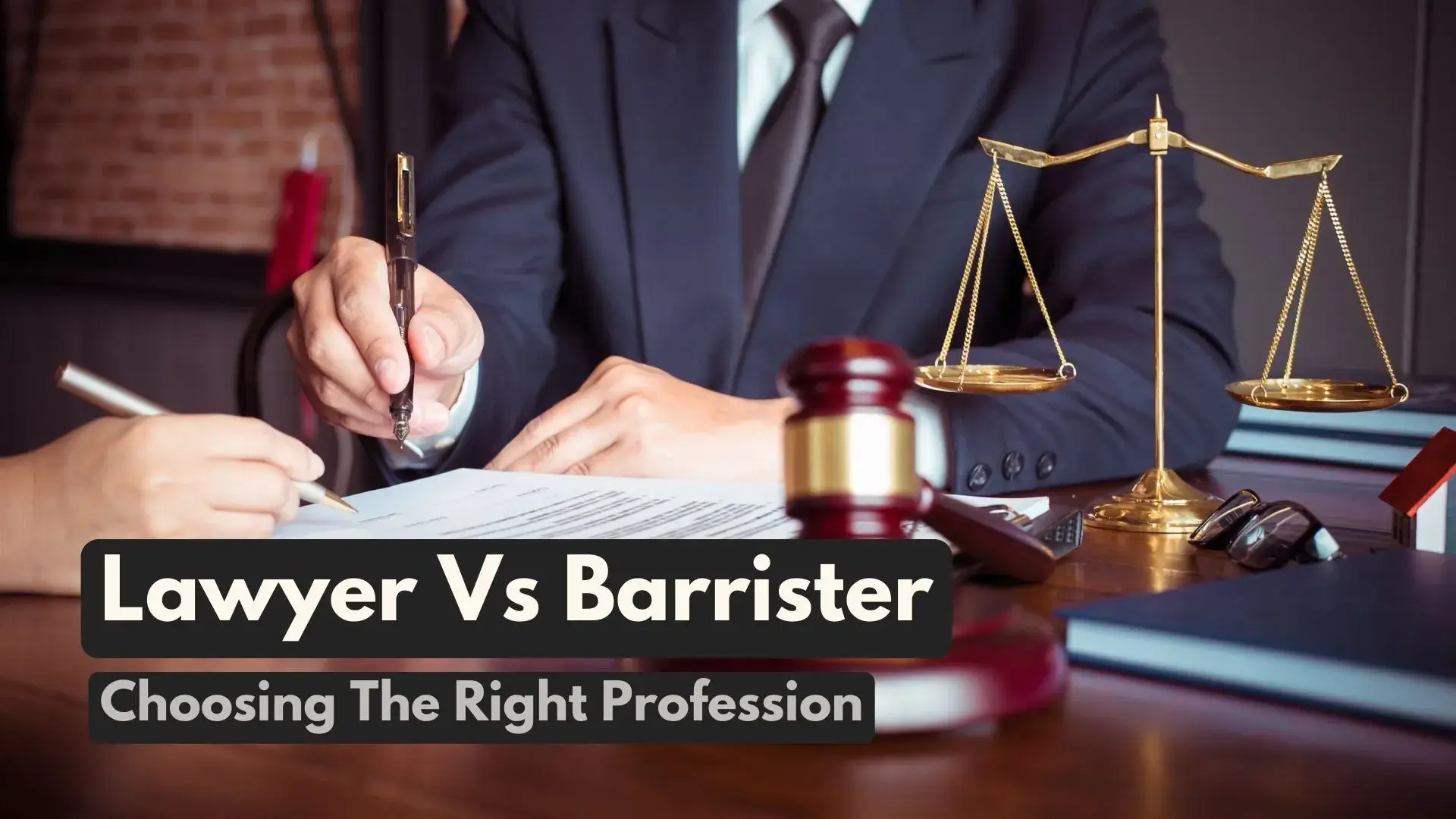In the complex world of legal professions, the terms “solicitor,” “lawyer,” and “barrister” are often used interchangeably, but they represent distinct roles within the legal system.
Each title comes with its own set of responsibilities, qualifications, and areas of expertise.
In this article, I will walk you through the differences between solicitors, lawyers, and barristers to provide you with a comprehensive understanding of these essential legal professions.
Legal matters often lead individuals to seek professional assistance, but the terminology can be confusing.
What distinguishes a lawyer, barrister, and solicitor from one another?
Of course! Despite having the same objective of offering legal counsel and representation, their responsibilities and roles are very different.
Difference Between – Solicitor vs. Lawyer vs. Barrister
| Roles | Lawyer | Barrister | Solicitor |
|---|---|---|---|
| Definition | A legal professional | A lawyer who specializes in advocacy | A lawyer who handles the non-courtroom aspects of a case |
| Typical work | Provides legal advice, drafts legal documents, and negotiates settlements | Argues cases in court | Provides legal advice, drafts legal documents, and negotiates settlements |
| Country | Used in many countries | Used in England, Wales, Northern Ireland, and some Commonwealth countries | Used in India |
| Education | Law degree from a recognized university | Law degree from a recognized university and one-year internship | Law degree from a recognized university |
| Licensing | Licensed by the relevant authority in the country they practice in | Licensed by the relevant authority in the country they practice in | Licensed by the relevant authority in the country they practice in |
| Work environment | Private law firms, government agencies, and non-profit organizations | Chambers, which are shared offices with other barristers | Private law firms, government agencies, and non-profit organizations |
| Specialization | Can choose to specialize in a particular area of law | Can choose to specialize in a particular area of law | Can choose to specialize in a particular area of law |
| Salary | Varies depending on experience, location, and specialization | Varies depending on experience, location, and specialization | Varies depending on experience, location, and specialization |
Defining Solicitors
Lawyers are professionals who offer clients knowledgeable counsel on a range of legal matters.
They deal with a wide range of issues, including conveyancing, will drafting, family law, and more.
Attorneys frequently work in law firms, corporations, or government agencies, serving as a middleman between clients and other legal professionals.
✅ Role and Responsibilities of an Esquire
Defining Lawyers
A lawyer is someone who practices law, which is the system of rules guiding how people and organizations behave as well as how conflicts are resolved.
Attorneys can prepare legal papers, give legal advice, and represent clients in court because they are trained to apply the law to particular situations.
Defining Barrister
A lawyer who specializes in advocacy, or presenting cases in court, is known as a barrister.
Barristers typically work in a team with solicitors, who handle the non-courtroom components of a case. Barristers are trained to argue cases before judges and juries.
There are certain Commonwealth nations, Wales, England, and Northern Ireland where the term “barrister” is used. “Advocate” is a similar term in Scotland.
The Role of Lawyers, Barristers, And Solicitors
Lawyers, barristers, and solicitors are all legal professionals, but they have different roles and responsibilities.
✅ Lawyers are the broadest term and can refer to any legal professional. In England and Wales, the term “lawyer” is often used interchangeably with “solicitor”.
✅ Barristers are lawyers who specialize in advocacy, or the presentation of cases in court. They typically work in a team with solicitors, who handle the non-courtroom aspects of a case.
✅ Solicitors are lawyers who handle the non-courtroom aspects of a case. This includes providing legal advice, drafting legal documents, and negotiating settlements.
The specific roles of lawyers, barristers, and solicitors vary depending on the country and the legal system.
However, in general, lawyers provide legal advice and representation to clients, while barristers focus on advocacy in court.
Here is a table summarizing the key differences between lawyers, barristers, and solicitors:
| Role | Lawyer | Barrister | Solicitor |
|---|---|---|---|
| Definition | A legal professional | A lawyer who specializes in advocacy | A lawyer who handles the non-courtroom aspects of a case |
| Typical work | Provides legal advice, drafts legal documents, and negotiates settlements | Argues cases in court | Provides legal advice, drafts legal documents, and negotiates settlements |
| Country | Used in many countries | Used in England, Wales, Northern Ireland, and some Commonwealth countries | Used in India |
✅ Lawyer Esquire [ Importance, Role, Fees, & Working Guide ]
Barristers : Masters of Advocacy
Barristers are legal experts who are internationally recognized for their proficiency in advocating on behalf of clients in court.
They are skilled at making compelling arguments, cross-examining witnesses, and presenting cases before judges and juries.
Barristers typically follow the advice of solicitors and concentrate on particular legal matters, like family law, criminal law, and commercial litigation.
Educational and Training Requirements
A solicitor’s or barrister’s career requires extensive schooling and training.
Both attorneys and barristers must graduate from law school; however, barristers can receive further training through courses such as the Bar Professional Training Course (BPTC).
Conversely, attorneys finish the Legal Practice Course (LPC) and frequently engage in training contracts.
Scope of Practice
In order to provide clients with comprehensive legal services, solicitors have a wider scope of practice. They manage negotiations, transactional work, and general legal counsel.
On the other hand, barristers concentrate mostly on representing clients in court and have specialized in particular areas of the law.
✅ Lawyer vs. Attorney: Choosing The Right Profession
Courtroom Dynamics: Who Represents Whom?
Lawyers represent the two parties to a case in a courtroom.
The party presenting the case is referred to as the plaintiff, while the party defending the case is referred to as the defendant.
The prosecutor is the lawyer representing the plaintiff, and the defense attorney is the lawyer representing the defendant.
The prosecution represents the government in criminal cases, and the defense lawyer represents the accused.
In civil cases, the plaintiff’s law firm represents the plaintiff, and the defendant’s law firm represents the defendant.
The attorneys for each party are responsible for presenting their client’s case to the judge or jury.
By presenting evidence, disputing the case’s facts, and cross-examining the witnesses, they achieve this. The lawyers are also accountable for making sure that the legal rights of their clients are upheld.
The judge or jury is responsible for deciding the case based on the evidence offered by the attorneys.
The verdict in a criminal case is rendered by the jury, which finds the defendant guilty or not. When a civil case goes to trial, the jury determines the winner and the amount of money that party should be awarded.
A judge or jury, the nature of the case, and the personalities of the lawyers can all influence the courtroom dynamics.
All lawyers do, however, have as their primary responsibility to safeguard their clients’ rights and act in their best interests.
The dynamics of the courtroom can be influenced by the following factors:
Criminal cases typically include more adversarial proceedings than civil cases.
This is due to the fact that while the defendant is attempting to establish their innocence, the government is attempting to establish that they are guilty beyond a reasonable doubt.
The lawyers’ personalities: Aggressive lawyers differ from one another. Their interactions with the jury or judge as well as how they present their case may be impacted by this.
The jury or judge: For deciding the case, the judge or jury is responsible. The case’s outcome may be impacted by their biases and personality.
The dynamics in the courtroom can greatly affect how a case turns out. In order to minimize any negative impacts, it is crucial for lawyers to be aware of the factors that may influence the dynamics.
Fee Structure and Billing
Depending on the nation, the legal system, and the specific attorney or barrister firm, the fee structure and billing of attorneys, barristers, and solicitors varies.
The fees charged by lawyers are affected by a few common factors, though.
The Type of Case
The amount of time and effort required of the lawyer will depend on the intricacy and difficulty of the case. In turn, this will affect the fees that are charged.
The Experience of The Lawyer
Law firms with more experience typically charge greater fees than those with less expertise. This is due to the fact that they frequently achieve better outcomes for their clients and possess greater knowledge and expertise.
✅ Understanding Esquire Titles – Definition – Roles
The Location of The Lawyer
Lawyers in large cities typically charge more fees than those in smaller communities. This can be attributed to two factors: increased rivalry among lawyers and greater living expenses in larger locations.
The Hourly Rate
For their services, attorneys typically charge an hourly rate. Each of the above-listed factors will have an impact on the hourly rate.
Disbursements
Law firms may charge for disbursements in addition to the hourly rate. Disbursements are the expenses a lawyer pays for a client’s case, including expert witness fees, travel costs, and filing fees to the court.
Law firms may also charge a contingency fee in certain cases. A percentage of the amount the client wins in the case is known as a contingency fee.
In cases where the outcome of the case is uncertain, this type of jury fee is typically used.
Before you hire a lawyer, it’s crucial to go over the billing structure and fee. This will make it easier for you to comprehend the fees and what you will be charged.
The billing structure and fee schedule of lawyers, barristers, and solicitors should also be taken into consideration.
Even in cases when the client loses or the case is dropped, the fees are typically non-refundable.
If the case takes longer than anticipated or if there are unanticipated costs, the fees might change.
Before you hire them, the law firm should be able to give you a written estimate of the fees.
✅ When Can You Use Esquire After Your Name – With Example
Solicitor Vs Lawyer : Which One Do You Need?
Depending on the legal matter at hand, a solicitor or a barrister may be selected. A solicitor is usually adequate for non-court situations and general legal guidance.
A barrister’s specialized skills become invaluable if representation in court is required.
Barristers Vs. Solicitor: Making the Right Choice
A solicitor and a barrister can lead to the best results while facing legal issues. While barristers excel in courtroom advocacy, solicitors make sure that all paperwork and preparations are in place.
The Evolution of Legal Practice
The legal profession continues to evolve with advancements in technology and changes in societal norms. Automation, digital communication, and remote proceedings are reshaping how legal services are delivered.
Future Trends in the Legal Profession
Solicitors and barristers must adjust to new tools and methods as artificial intelligence and machine learning become more prevalent in the legal industry.
A key component of providing efficient and effective legal services will be the capacity to utilize technology.
✅ Lawyer vs. Attorney vs. Esquire: Understanding the Distinctions
Conclusion
There are unique and connected roles for solicitors, attorneys, and barristers in the complex legal system.
Understanding these roles will equip you to confidently navigate the legal landscape, whether you’re looking for comprehensive legal assistance, courtroom representation, or specialized advocacy.
FAQs Related To Solicitor vs Lawyer vs Barrister
Can a solicitor represent me in court?
Solicitors can represent clients in lower courts for certain matters, but barristers are typically engaged for courtroom representation in higher courts.
What’s the difference between a lawyer and an attorney?
While the terms are often used interchangeably, “lawyer” is a broader term that includes both solicitors and barristers, whereas “attorney” is commonly used in the United States.
How do I choose between a solicitor and a barrister?
Consider the nature of your legal issue. For general advice and non-court matters, a solicitor is suitable. If you need courtroom representation, a barrister is the right choice.
Are solicitors and barristers regulated?
Yes, both solicitors and barristers are regulated by legal authorities to ensure professional conduct and adherence to ethical standards.
What role does technology play in modern legal practice?
Technology plays a significant role, in streamlining legal processes, enhancing research capabilities, and facilitating remote communication and proceedings.











